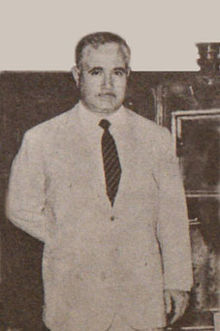- Muhammad Najib ar-Ruba'i
-
Muhammad Najib Ar-Ruba'i 
1st President of Iraq In office
July 14, 1958 – February 8, 1963Prime Minister Abd al-Karim Qasim Preceded by Faisal II (as the King of Iraq) Succeeded by Abdul Salam Arif Personal details Born 1904 Died 1983? Nationality Iraqi Occupation President of Iraq (1958-63) Religion Sunni Islam Muhammad Najib Ar-Ruba'i (Arabic: محمد نجيب الربيعي) (also spelled Al-Rubai) (1904-1983?) was the first President of Iraq (Chairman of Sovereignty Council) from July 14, 1958 to February 8, 1963.[1]
Together with Abdul Karim Qassim,[2] he was one of the leaders of the coup that toppled King Faisal II in 1958.
While Qassim became prime minister and held most of the power, Rubai was elected head of state with the title of Chairman of the Sovereignty Council. The Sovereignty Council had a representative from each of the three main religious sects. Rubai represented the Sunni community.
In 1963, Qassim was deposed by another coup led by Abd as-Salam Arif. Ar-Rubai had to retire from politics.
Ar-Ruba'i died in 1983.[1]
References
- ^ a b Cahoon, Ben (2000). "Iraq - Chronology" (web). worldstatesmen.org. http://www.worldstatesmen.org/Iraq.htm. Retrieved 2008-05-25.
- ^ "Iraq PROFILE" (web). U.S. Department of State. Archived from the original on 2008-05-16. http://web.archive.org/web/20080516084622/http://www.state.gov/outofdate/bgn/i/50942.htm. Retrieved 2008-05-25.
Preceded by
Faisal II (as King of Iraq)President of Iraq
July 14, 1958 – February 8, 1963Succeeded by
Abd as-Salam ArifHeads of state of post-Ottoman Iraq Kingdom of Iraq (1921-1958)
(under British mandate, 1920-1932)
Kings of IraqRepublic of Iraq (since 1958)
Presidents of IraqMuhammad Najib ar-Ruba'i† · Abdul Salam Arif† · Abd ar-Rahman al-Bazzaz*† · Abdul Rahman Arif† · Ahmed Hassan al-Bakr† · Saddam Hussein† · occupation · Ghazi Mashal Ajil al-Yawer · Jalal Talabani* acting † deceasedCategories:- 1904 births
- 1983 deaths
- Presidents of Iraq
- Iraqi politician stubs
Wikimedia Foundation. 2010.
